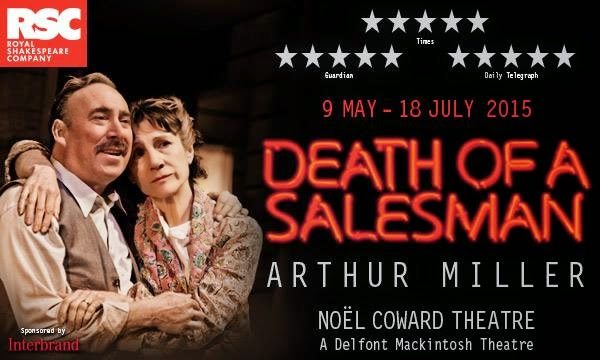Review: The RSC presents Arthur Miller’s ‘Death of a Salesman’
Artistic Director, Gregory Doran and British theatre titans, Antony Sher and Harriet Walter reunite to produce one of the most moving and relatable productions of Arthur Miller or any other playwright you will see this year. There’s something about Death of a Salesman that separates it from the rest of Miller’s work. It contains all the elements that let us know this is an Arthur Miller play: an American setting, working class characters, men seeking to make their mark on the world and women as either loyal wives or objects of sexual desire. Yet, there’s more to this one.
There’s something about Willy Loman that reminds us all of our fathers, there’s something admirable about his wife, Linda’s seemingly passive devotion, and there’s something about those ‘timeswitches’ that prompts an indefinable pang within each audience member. And there’s something about this production which separates it from many of the others I have seen in recent times.
Antony Sher’s interpretation of this modern-day Lear is unexpectedly vulnerable and endearingly fragile. Of course, he’s impetuous, he has rage and he repeatedly delivers his command to Linda to ‘stop interrupting!’ to great comic effect, as you would expect. But, it’s the desperation, the regret and the mutual idolisation between him and his sons during their younger years that lingers in your memory. His opening exchange with Linda is not characterised by the frustration and irritation that an initial reading of the script would suggest. Sher enters the stage in a dream-like state, he appears confused and stranded and engenders pity in a way which deepens the tragedy of his inevitable end. His performance is at its strongest when we are able to observe the contrast between the ambitious, confident salesman with a briefcase who promises his family a better future and the feeble, impotent old man whose memories comprise of mostly regrets, failed endeavours and missed opportunities.
Harriet Walter achieves a similar feat through her interpretation of Linda, a character often (perhaps incorrectly) cited as the epitome of a female persona constructed to merely fill a space; a perfect example of the seemingly fruitless, compliant loyalty that characterises many of Miller’s women. Unlike these characters, however, Linda is given her moment. The play’s most famous line is uttered by her as she reveals to her sons that their father is trying to kill himself. Harriet Walter takes full advantage of this moment, in an essentially flawless New York accent she proclaims: ‘Attention must finally be paid to such a person!’ This iconic speech is delivered with an assurance and a tenacity of which one would never expect Linda to be capable. Walter effortlessly harmonises this determination and unwavering devotion with a palpable sadness and an indomitable fear for her husband’s life.
Through the combination of Gregory Doran’s experienced direction, Stephen Brimson Lewis’s innovatively versatile stage design and Tim Mitchell’s impeccable lighting, this production is able to shift seamlessly between locations, time periods and states of mind. It has a fluidity which allows this to happen without compromising the performances of its actors and the relationship established between them and the audience. The towering apartment blocks which stand on either side of the Loman house reflect the claustrophobic, suffocating nature of the New York suburbs, they stand as sufficient representations of the capitalist society in which Willy finds himself lost and defeated, shifting from opacity to transparency as we venture inside Willy’s mind.
The Royal Shakespeare Company has fittingly and admirably marked Arthur Miller’s centenary with a high-quality staging of his greatest play. The excellent performances of the cast and the originality of the creative team have combined almost faultlessly to allow this production to go down as one of the finest interpretations of Miller’s work you will ever see on the British stage.
Death of a Salesman runs until 2nd May at the Royal Shakespeare Theatre, Stratford-upon-Avon before transferring to the Noel Coward Theatre in London from 5th May – 18th July.

Comments